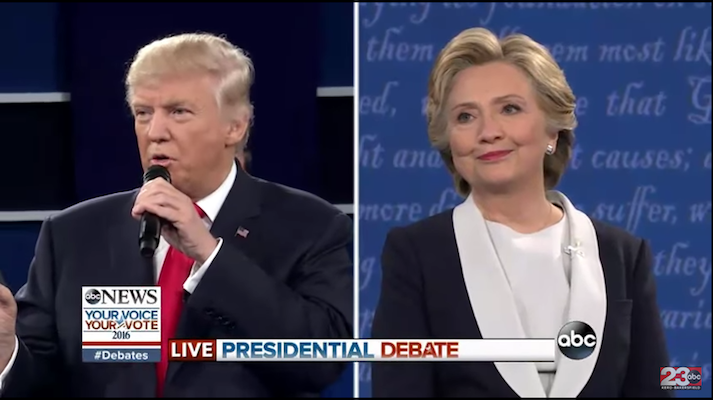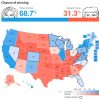
The fierce challenge that Donald Trump mounted against Hillary Clinton –as expressed in the polls– during the final days of August and the first three weeks of September appears to have dissipated. In the two weeks since the first presidential debate, the trend in all of the polls (which actually began nearly a week before) has continued to move in favor of Clinton. This is certainly true of the national polls, both those which pose a two-race race (in which Clinton now holds a 4.6 percentage point (pp) lead, according RCP average), and those which include the third party candidates, Johnson and Stein (where Clinton’s lead rose from a mere 0.7pp on September 18, and from 1.6pp at the start of the first debate on September 26, to 3.7pp at the beginning of last night’s debate in St. Louis).
More significantly, Trump’s September surge has also gone into retreat in nearly all of the key swing states. Michigan, Pennsylvania, Ohio, Virginia, North Carolina, Florida and even Colorado and Nevada –all states which Trump put into play (and in many cases even temporarily captured) during his remarkable run in the first part of September– have now tumbled back like dominoes in the direction of Hillary Clinton.
Trump’s electoral retreat has been most noticeable at the front lines of his September assault, in Ohio and Florida (the largest electoral prizes in terms of electoral college votes among the swing states), where Clinton has converted Trump’s previous leads of 3.8pp (Oct. 3) and 1.2pp (Sept. 18), respectively, into margins of 0.5pp and 2.4pp of her own today. But this same sea change swing to Clinton has played itself out in all of the other secondary and tertiary swing states.
However, all of this reflected the situation only as of the beginning of last night’s second debate –which (according to at least one commentary) was unique in US history for the viciousness and personal nature of the mutual attacks. There are, of course, those on all sides of the divide in the US who today claim that one or the other of the candidates won the debate, clearly. For evidence, please refer to the links chosen by Real Clear Politics to represent the range of political reaction and opinion each morning and afternoon in the US. But those who have been betting actual money on one or the other of the candidates in a two-way race perhaps reveal to us a better sense of the impact of both of the debates thus far on the eventual outcome.
Recall that on the day before the first debate (Sept. 26), the real-time betting odds (tracked by PredictWise, via RCP) in favor of Clinton had fallen to the lowest of the campaign (only 67% of live bettors were betting on her). But the bettors began to shift during the course of the first debate (whatever the idiosyncratic reasons they had) and shortly after the debate 70% were betting on Clinton. Over the course of the week that followed, as Trump bogged himself down in the Alicia Machado controversy, the live betting odds increase to 75%. However, they surged yet again at the end of last week when a video was released revealing Trump speaking about concrete women (back in 2005) in a very, very old school way. By the opening of last night’s second debate, they were back at 80%. Today, the day after the second debate, they have ticked up to 81%, matching Clinton’s campaign peak in mid-August.
In a concluding observation, as we now wait for the first post-debate polls, it is worth noting the ‘issues’ which have been driving the election campaign and the debates over the course of recent weeks. On the economic front, the issue of Trump’s tax returns have even eclipsed trade, the TTP and the TTIP as the lightning rod of discussion and opinion (and probably accounted for Trump’s initial slide in the polls during the week before the first debate). On the domestic and social front, Trump’s attitude toward and behavior with women have tended to crowd out other concerns (and probably accounts for much of his slide since the first debate).
Finally, on the ground of foreign policy and international affairs, the focus has been Russia and Syria (which, as both issues and allies, are linked). In last night’s debate, Trump continued to deflect criticism of both Vladimir Putin and Bashar al-Assad, claiming that they are both fighting ISIS more effectively than the US. In the meantime, the US government had just accused Russia of engaging in cyber activities designed to aid Trump in the election. The US had also just accused Russia of committing barbarism and war crimes in Syria. Whether you believe the Russians’ methods are subtle or not, it does appear that they are (whatever their own idiosyncratic reasons might be) facilitating al-Assad’s destruction of Aleppo. Trump does not appear to view this as problematic, even if ISIS is not the object of the bombings in Aleppo.
As a result of Trump’s stumblings in both the social and foreign policy terrains, a number of high level Republican leaders and intellectuals have recently publicly abandoned him. Still others are waiting just a bit longer to see if the second debate damages Trump even more. Once the media cycle on ‘Trump and women’ runs itself out (and as the counter-attack of Trump to accuse both of the Clintons of the abuse of women helps to bring it to a halt), it is very possible that foreign policy issues (specifically Russia and the Middle East) will dominate the final weeks of the campaign. Indeed, it is likely that one particular issue that has not had much resonance so far will be brought to the fore along with Trump’s positions and attitudes on Russia and Syria: his extensive, high-level business dealings in many countries around the world that are key to US strategic interests, either as allies or as adversaries.


